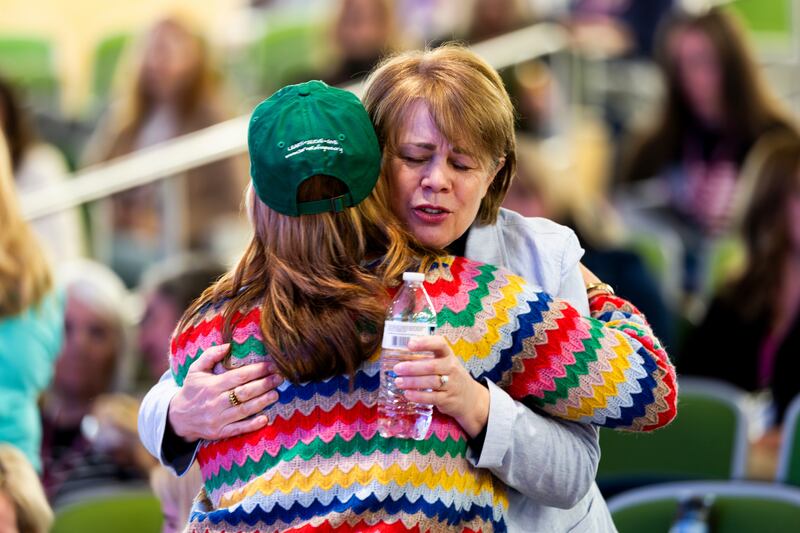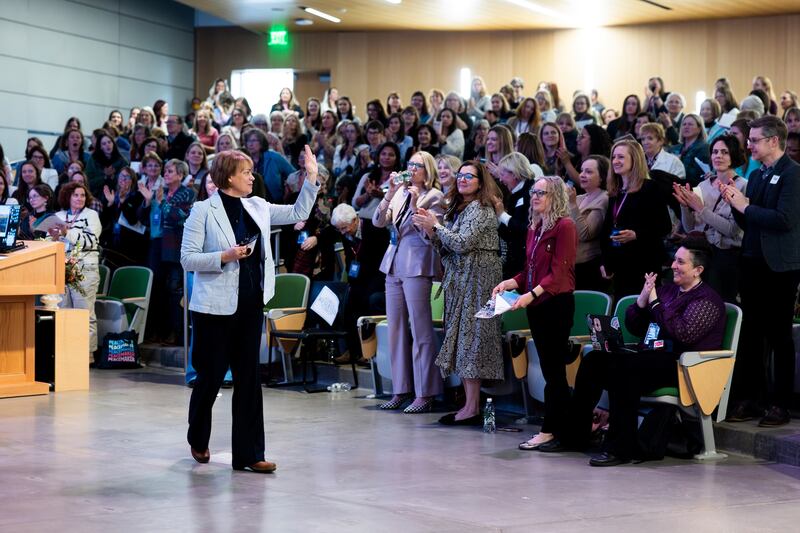There are a few people I really fangirl over, and Sharon Eubank is one of them.
Once, I went straight from the airport to a speaking event she was doing at Utah Valley University so I could hear her talk about being good global citizens. I’ve watched many of her videos online and listened to podcasts she’s been on, including one with first lady Abby Cox where she talked about doulas and their role in improving maternal and newborn health in this country’s inner cities. As a former doula, doula trainer and midwife, that topic is always near and dear to my heart.
I love that she has such a heart for service and for reaching out to those “who don’t fit in,” as she said at BYU’s Women’s Conference in 2017. Acknowledging we all feel like we don’t fit in, at least sometimes, she asked women to “open up the circle of sisterhood to many more kinds of backgrounds and see those backgrounds as valuable instead of as handicaps.”
Backgrounds, she said, that include “people with disabilities, recovering addicts, new in the church, old pioneer stock, American, Syrian, Chilean, Samoan, working, home with kids, wishing to have a job, poor, rich, in debt, happy, depressed, bipolar, autistic, serving others, being served, liberal, conservative, don’t care, immigrant, gay, converted and unconverted.”
Did I mention I love her?
It will come as no surprise, then, that I was in the audience with 500-plus other women at UVU on Saturday, March 22, when Eubank spoke at the Mormon Women for Ethical Government (MWEG) annual conference on “Community Service as an Instrument of Peace.” Eubank, speaking in her personal capacity, began by sharing a story of learning to see the humanity in others and in placing herself in the story of the Good Samaritan. Which one are we? Do we “pass by” people who make us uncomfortable?

“When things get really messy and hard ... my one reaction is to go back to the basics,” she said, beginning with seeing the humanity in others, even when they are very different from ourselves. They may espouse different ideologies, do “all kinds of things we don’t understand,” but we can see them with the “wonder of who they really are and the ability of God and godliness to be manifest in them.”
Eubank shared five values she believes apply to our desire to make our communities better, to build bridges with people, to be a force for good and to “wage peace.” She said she wants to be a part of a community that wages peace as aggressively as nations wage war. The only way she knows how to do that, she said, is to make sure her actions align with her values.
The five values she listed are: looking for common ground, reaching across the political aisle or whatever else divides us, never letting issues interfere with relationships, knowing that trusted relationships spark change and the small bits really matter — small bits of time, small bits of money, small bits of attention all add up.
Eubank then left the audience — who gave her a standing ovation at the beginning and the end of her talk — with 25 different ways to serve our communities. Those included some “big things,” like running for office and serving on committees or boards, to smaller things, like sharing music with someone you love, praying for those with whom you disagree and putting your phone away to look people in the eyes.

I was intrigued with the story she shared about babies in Africa who are strapped to their mothers’ backs and don’t get a lot of visual stimulation, mostly seeing the back of their mother’s head. And then, she said, you can go to any park in the U.S. and see people there, glued to their phones instead of looking at what — or who — is around them.
“Don’t let (this month) end without taking some action,” she encouraged. Even in the midst of our busy, messy lives, lives that sometimes feel like a tornado has gone off inside them, we can do little bits. We can band our little bits together, and Christ will light the path for us.


